- Home
- Christina Lauren
Dirty Rowdy Thing Page 2
Dirty Rowdy Thing Read online
Page 2
Which begs the question, if he’s only visiting for the weekend, then why did he bring his truck all the way here from Vancouver Island?
I don’t have much time to ponder this because my phone buzzes in my pocket from my mom’s text and I pull it out only to see the words, Will you come to the house right away please, written across my screen.
I AM A fixer.
When I was four and broke my mother’s favorite necklace while trying it on, I spent three hours in my tree house trying to glue it back together. I succeeded only in gluing several fingers together. Senior year when Mia was hit by the truck and nearly paralyzed, I sat by her side every day for the entire summer she spent in a toe-to-waist cast. I knew that if I sat there long enough she would need something and I would be there, ready. I brought her DVDs and ridiculous teen magazines. I painted her nails and went so far as to smuggle the oddest things into her room—wine coolers; her boyfriend, Luke; her cat—just to see her smile. When Lola’s father was sent to Afghanistan—and then when he returned, shaken and different, and Lola’s mom abandoned them both for good—I brought groceries and dinners, anything that would take the tiniest burden off them. And when Ansel was too man-brained to fix things with Mia, I forced my way in there, too.
When my friends need something, I do it. When someone I love can’t solve a problem, I find a way. For better or worse, it’s what I do.
So when I pull into the drive and sit down beside my little sister and across from our parents in our light, airy, happy family room—a room that, right now, feels like a tomb—I’m immediately on high alert. On an average day, our family is boisterous. Right now, we are silent. I feel like I should whisper my hellos. The curtains are open, but the thick fog of the marine layer outside makes the room feel gloomy and dark.
My family is—and has always been—the center of my world. My mom was an actress when my parents got married, and Dad’s career didn’t take off until I hit high school. So when I was little, Dad and I would travel with Mom from one set to the next. Until my sister Bellamy was born when I was six, it was just the three of us most of the time.
Dad is the emotionally intuitive, nurturing one, all creative energy and passion. Mom is the beautiful, calm centering force in our family, leading the house with a wink behind my father’s broad shoulders. But right now she sits next to him, gripping his hand in both of hers, and I can see from across the low coffee table that she’s sweating.
I have it in my head that they’re going to tell us they’re selling the house. (I would picket in the driveway until they backed down.) That they’re moving to Los Angeles. (I will lose my shit.) That they’re having some trouble and are going to spend some time apart. (This I can’t even fathom.)
“What’s going on?” I ask slowly.
Mom closes her eyes, takes a deep breath, and then looks right at us, saying, “I have breast cancer.”
After these four words, the hundreds that follow sound fuzzy and shapeless. But I understand enough to know that Mom has a tumor that is roughly three centimeters in her breast, and that cancerous cells were found in several lymph nodes. Dad found the mass while they were in the shower one morning—I’m too relieved he found it to be weirded out by this information—and she didn’t want to tell us anything until she knew more. She’s opted for a mastectomy, followed by chemotherapy, and they’ve scheduled surgery for Monday . . . three days from now.
It’s all somehow moving too fast, and, for a fixer like me, not fast enough. I can rattle off questions as if I’m reading from a book: Have you gotten a second opinion on the pathology? What is the recovery time for the surgery? How soon after can you start chemo? What medications will they give you? But I’m too stunned to know if my rapid-fire questions are an appropriate reaction at all.
When Dad mentioned he found the lump, Bellamy burst out laughing and then immediately broke down into hysterical sobs. Mom sounded like an automaton for the first time in her entire life as she detailed what the doctor had told her. Dad remained uncharacteristically mute.
So this is what I’m saying: What is an appropriate reaction when the center of your world finds out she’s mortal?
Once she’s finished telling us everything she knows—and once she’s promised us that she feels strong, and fine just fine—she tells us she wants to go lie down and be alone for a little while. But I can hardly breathe, and from the look on my father’s face, he’s faring much, much worse.
Bellamy and I sit and watch Clue with the volume practically on mute. She’s curled in my lap, and Dad has disappeared down the hall to their bedroom. On my phone’s browser, I read every website I can find on stage-three breast cancer, and with every new piece of information I mentally update the odds of my mother’s survival. The credits are rolling and then the screen goes blank before I realize the movie is over.
BUT THERE’S NOTHING I can do now. Mom doesn’t want us to do anything; she doesn’t want me taking care of her. She wants us to “live our lives” and “not let this monopolize our thoughts.”
Does she not know Dad and me at all?
Only a few hours after she tells us, this cancer has become a thing, a living, breathing entity that takes up just as much space in our house as any of us do. It’s all I can think about, all I see when I look at her. And so I have no idea what to do with myself.
“I thought there was a party at Lola’s new place tonight,” Mom says, and I snap back to the conversation. She looks perfectly normal, if not a little tired, flipping a grilled cheese and glancing at me over her shoulder. You know, making us dinner as if it’s a normal Friday night, nothing different. I can tell all three of us are watching her cook and suppressing our need to suggest she go sit down, relax, let us bring her something to eat.
She would kill us.
“There is . . .” I hedge and steal a few shreds of cheese from her bowl. “But I’m staying here.”
“No, you’re not.” Mom turns and gives me her best don’t-argue-with-me face. “Oliver’s store opens tomorrow.”
“I know.”
“You’re going out, and you’re staying at your place tonight,” Dad insists. “I’m taking Mom to a movie and then I’m bringing her home and”—he does a slick little dance move behind her—“you won’t want to be home for what comes next.”
Oh God. I press my hands over my ears as Bellamy ducks and pretends to hide under the breakfast bar.
“You win,” I tell him, trying to keep my tone light and shove down the panic I feel welling up inside of me. I don’t want to be away from my mom. “But tomorrow we’re doing something with all four of us.”
Dad nods and smiles bravely at me.
I’ve never seen him look so shaken.
IT’S ACTUALLY GOOD to get out, if I’m being honest. The worst thing we could do for Mom is sit around and watch every move she makes with our worried, woeful expressions. Dad assured me my role will come in the next few weeks and months. I can work with that. Bellamy is sweet, but she’s only eighteen and also oddly incapable. Every small errand stresses her out. It makes her good for the role of Stay Positive! I’m the daughter who gets shit done. I’ll be the daughter who drives Mom to appointments, asks too many questions, takes care of her when Dad needs to work, and will probably drive her crazy.
But right now, I feel awful.
And if there is anyone I want to see other than my family tonight, it’s my girls.
Lola’s new apartment is a huge step up from the dorms. I expected her to move in with me when we graduated, but she wanted to be downtown, and every time I visit I can’t really blame her. It’s situated just north of the Gaslamp Quarter in a new, giant-windowed high-rise with wide-open rooms, a view of the harbor, and a location only blocks away from the Donut Bar. Lucky woman.
“Harlowwwww!” My name is shouted across the large living room and quickly I’m surrounded by four arms. Two are Lola’s, and two belong to London, Lola’s new roommate and the most adorable all-American girl you can imagine:
sandy blond hair, freckles, dimples and a constant smile. She cools it down perfectly with her hot nerd girl glasses and wild clothes. Tonight, for example, I see she’s wearing a blue Tardis T-shirt, a polka-dot green and yellow skirt, and black-and-white–striped kneesocks. With Lola’s retro black dress and sleek Bettie Page thing going on, they make the rest of us look tragically unhip.
“Hi Lola-London,” I say, pressing my face into Lola’s neck. I needed this.
Lola’s voice is muffled against my hair. “That sounds like a stripper name.”
London laughs, extracting herself from the tangle. “Or the name of a drink?”
“One Lola-London on the rocks,” I say.
“Well,” London says, pointing to the cooler on the kitchen floor. “We can try inventing it tonight. I swear I bought everything. Mixers and booze and beer and nuts and—” She closes her eyes, raises her right hand in a rocker salute, and belts out, “Fritos!”
She turns running off to answer the door and I give Lola my nod of approval. “I like that girl.”
“Someone told me there is a fiesta in this casa!”
I turn to the sound of Ansel’s deep, accented voice, and every sound in the apartment dips for a beat before applause and laughter break out. He’s wearing a sombrero filled with tortilla chips. Because he’s an adorable idiot.
Mia breaks away from him, making a beeline to me, and wraps her arms around my shoulders. “You okay?”
I called Lola and Mia earlier, gave them both the truncated update, and they know me well enough to anticipate the magnitude of my panic.
I blink away from the delightful spectacle of Ansel doing some weird little bullfighter dance. “Eh. You know.”
She pulls back and studies my face before deciding, accurately, that I’m here for distraction and not to discuss my mom. We all turn to watch Ansel as he offers sombrero chips to someone. Seriously, his inner child is definitely alive and kicking.
I draw a circle in the air around my head. “What is with the—”
“No idea.” Mia cuts me off. “He and Finn went out for beers earlier and back he comes with it. He hasn’t taken it off in hours, but has refilled it three times. Stand back ladies”—she bends, digging a beer out of the cooler—“he’s all mine.”
And at the mention of his name, I catch sight of Finn across the room. He must have come in with them. My stomach does an annoying clench-warm-flip move when he laughs over something Ansel says and lifts his arm to adjust his baseball hat. His bicep flexes and my stomach ignites. I chug half my beer to make the feeling go away, imagining the hiss and steam as the metaphorical flames are put out.
“I didn’t know Finn was coming tonight.” But what was I thinking? That they would leave him at home alone? Finn is just one more complication my already frazzled brain can’t quite handle right now.
Mia twists the cap off her beer and watches me, a little smile in her eyes. “Is that okay?”
Civil. Band of misfit buddies, I remind myself. “You know it’s fine.”
“As long as it doesn’t try to speak, right?”
Laughing, I nod. “Right.”
Lola rubs my back and then tilts her head, indicating she’s going to join the people gathering to play cards. “You good here?”
“Yeah,” I tell her. “I’ll probably just hang back and watch you guys be awesome.”
After making sure I don’t need company, Mia follows her, and I’m left alone in the brightly lit kitchen, watching the small group around the dining table. Ansel licks his thumb and then begins dealing cards, tossing them expertly across the table to each player. I feel a little lost, like I shouldn’t be here but unable to go home, either. I’m too tight in my skin, too warm in this apartment.
A shadow dips past me and when I turn, I find a bleached-blond mohawked guy bending to pull a wine cooler out of the fridge.
“Interesting beverage choice,” I say. “Passion punch!”
He turns and laughs, nodding in total agreement. He’s gorgeous, if not a little dirty, but his smile showcases a mouthful of perfect, white teeth—a La Jolla hippie boy. Of course. “Have you ever had these? They taste like juice!”
The cheap wine cooler is a newfound, amusing novelty? Definitely a La Jolla hippie boy.
“I’m Harlow,” I say, extending my hand. “And if you want juice, why don’t you just drink juice?”
He shakes it. “There is very little trouble to be had in juice,” he says, before pointing the bottle at his chest and adding, “Not-Joe.”
“ ‘Nacho’?”
“No. Not. Joe. Oliver, my new boss? Calls me Joey. I think he’s fucking with me, like a kangaroo thing because he’s Australian? But it isn’t my name.”
I wait for him to give me his real name—obviously he can’t have known Oliver long enough for him to be called Not-Joe more than a few months—but he doesn’t. “So you go by Not-Joe?”
“Yeah!”
“All the time?”
“Yep.”
“Well, okay then, it’s nice to meet you.” Despite the fact that I fear Not-Joe is a few synapses short of an invertebrate, I look him over and instantly like him, anyway. He’s wearing board shorts and a T-shirt and clearly has absolutely nothing but earnest giddiness to be right here, doing exactly this. “So you’re going to work at the store?”
When he nods, gulping down half his wine cooler in a single swallow, I add, “Tomorrow should be pretty exciting for you guys.”
“It’s gonna be good. Oliver is the best boss. Or, I can tell he’s going to be. He’s just so laid-back.”
I look across the room at where Oliver is concentrating so hard on the cards in his hand I fear they might incinerate. Unlike Finn, who doesn’t seem to worry much about his appearance, but tilts the odds in his favor by keeping his hair cut short, his face usually clean-shaven, Oliver is hot in an accidental sort of way. I haven’t really decided if he’s as oblivious about it as he seems, but I do know he’s a pretty intense guy, and given that he’s only thirty and opening a high-profile comic store in the hippest area of San Diego, I don’t think he’s quite as laid-back as Not-Joe is hoping.
I look back to the hippie boy. “What are you going to be doing there?”
“Selling comics and stuff.”
I laugh. This guy unsupervised must be a sight to behold. “Oh, you mean working the front?”
“Yep. Working the front. And sometimes the back.” He laughs to himself. “The re-gis-ter,” he sings.
“Exactly how high are you, Not-Joe?”
He stops moving and seems to do a lengthy mental inspection. “Pretty high.”
“Want to do some shots?”
Because really, there’s no way I’m ever having sex with Not-Joe, but my second favorite thing to do with guys is watch them get drunk.
We line up a couple and toss them back, just as I see Finn stand from the table. He tosses down his cards, clearly folding as he pulls off his cap, scratches his head with the same hand, and then slips it back on again. I hate that I find the maneuver so completely sexy. When he looks up and sees me in the kitchen with Not-Joe, he narrows his eyes for a beat and then starts to walk toward us.
“Oh, shit,” I mumble under my breath.
“Does the Hulk belong to you?” Not-Joe asks, tilting his head.
“Not even a little.”
“Still. Look at the intensity in his eyes,” he whispers drunkenly. “The lion prowls.” With a little shiver, he seems to clear his trance and chirps, “I’m headed to the little boys’ room.”
“Thanks,” I grumble to his retreating back, as Finn slides between me and the counter, leaning a hip against it.
Tonight I’m missing my usual armor—my social enthusiasm, my confidence, and the ease that comes with knowing life is okay for everyone I love. A tiny alarm in my brain signals that talking to Finn right now might be a terrible idea. We will either end up fighting or fucking, and Finn does neither with any sort of tenderness. But I refuse to step b
ack and can feel the heat coming off his chest. His hat is pulled low over his eyes, so I have to rely on the curve of his mouth to interpret his mood. So far, he seems . . . bored, angry, pensive, or asleep.
“Fancy meeting you here.”
“Finn.” I acknowledge him with a little nod.
His smile starts at one corner and twists across his lips. Damn him and his amazingly flirty mouth. “Harlow.”
I saw my teeth over my bottom lip as I consider him.
Mindless chatter won’t work here, but I’m not entirely sure I can handle his rough edges tonight when I’m feeling so threadbare myself. Finn doesn’t fit into any of my easily predetermined boy-categories, and maybe there’s a challenge in that.
He is hard to read, easy to look at, and no matter how bad an idea it may be, it’s nearly impossible to resist pulling him closer.
Fighting or fucking.
Both of those options are starting to sound pretty good.
Chapter TWO
Finn
I DON’T REMEMBER THE last time I was at a house party surrounded by a bunch of obnoxious twentysomethings on their way to varying degrees of hammered. I am not a party guy, but I agreed to come along because Ansel is in town, and the last time we saw each other was Vegas, when the end of a fun reunion crumbled into matrimonial chaos. But somehow tonight I end up nowhere near the kid, with a keg cup in my hand, and halfway to buzzed for the first time in months, standing close enough to Harlow Vega to touch her.
It doesn’t surprise me that we’re standing this close or that I’d really like to touch her.
What surprises me is that Harlow is the one separated from the rest of the party, hanging out in the kitchen with Oliver’s stoner employee. Despite our Vegas nuptials and Vancouver Island bangfest, it’s fair to say I don’t really know much about her. But I do know her type, and if there’s a table at a party, girls like her are usually pounding, lying, or dancing on it.

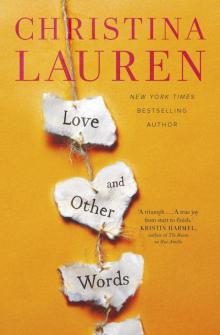 Love and Other Words
Love and Other Words Autoboyography
Autoboyography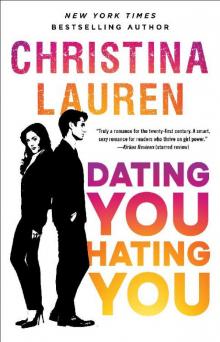 Dating You / Hating You
Dating You / Hating You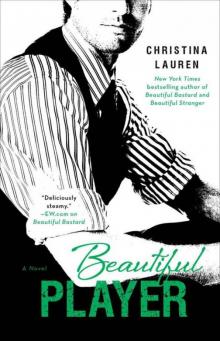 Beautiful Player
Beautiful Player Beautiful Bombshell
Beautiful Bombshell Beautiful Stranger
Beautiful Stranger Beautiful Bastard
Beautiful Bastard Beautiful Secret
Beautiful Secret The Unhoneymooners
The Unhoneymooners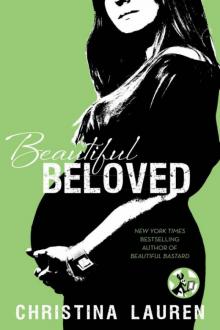 Beautiful Beloved
Beautiful Beloved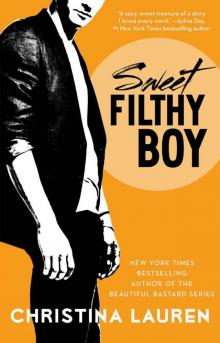 Sweet Filthy Boy
Sweet Filthy Boy Dark Wild Night
Dark Wild Night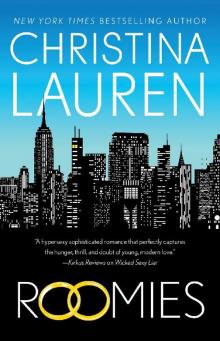 Roomies
Roomies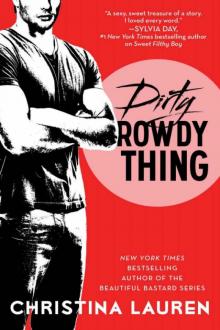 Dirty Rowdy Thing
Dirty Rowdy Thing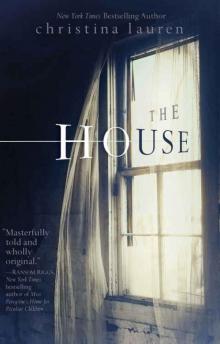 The House
The House Beautiful Bitch
Beautiful Bitch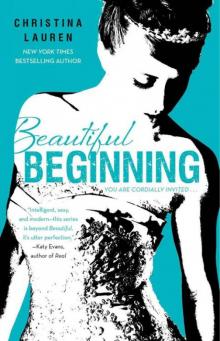 Beautiful Beginning
Beautiful Beginning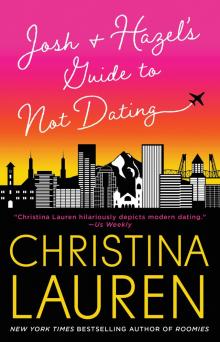 Josh and Hazel's Guide to Not Dating
Josh and Hazel's Guide to Not Dating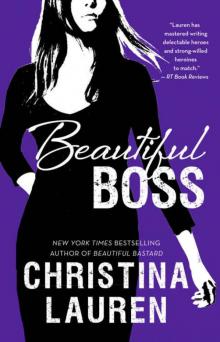 Beautiful Boss
Beautiful Boss In a Holidaze
In a Holidaze Wicked Sexy Liar
Wicked Sexy Liar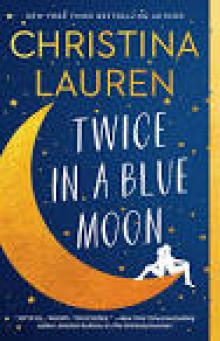 Twice in a Blue Moon
Twice in a Blue Moon Sublime
Sublime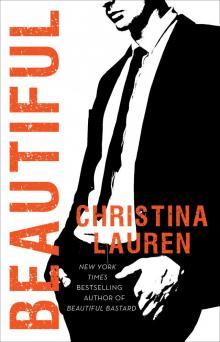 Beautiful
Beautiful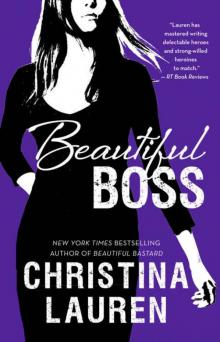 Beautiful Boss (Beautiful #9)
Beautiful Boss (Beautiful #9) Wicked Sexy Liar (Wild Seasons #4)
Wicked Sexy Liar (Wild Seasons #4)